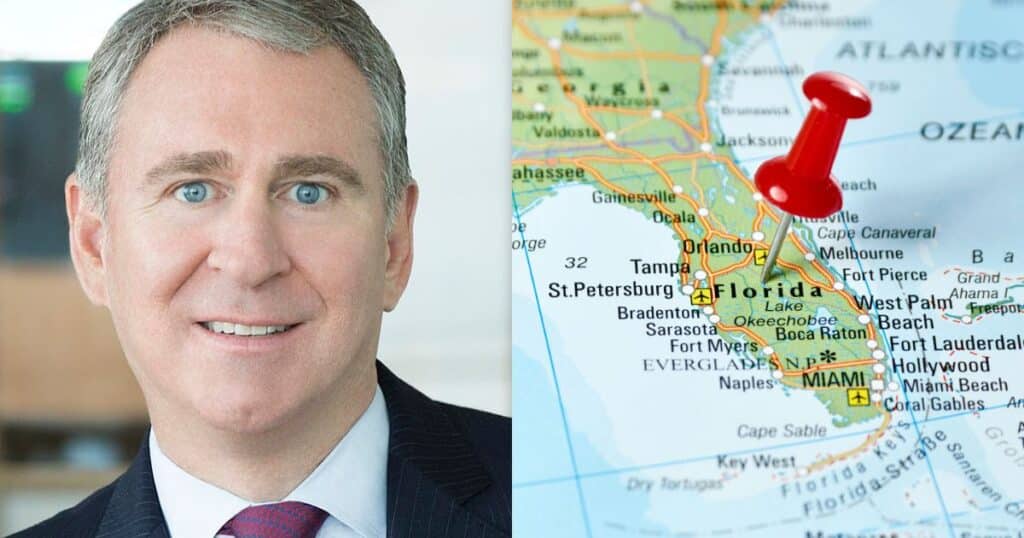Florida again finds itself at the center of a heated debate over the legalization of recreational marijuana in the state. Amidst the discourse, one name stands out—Ken Griffin. The billionaire founder of Citadel hedge fund has recently pledged a whopping $12 million to oppose the legalization attempt. His stance in a recent op-ed in the Miami Herald has sparked controversy and brought to light several contentious arguments, many of which are rooted in the traditional views of cannabis prohibitionists.

Who is Ken Griffin?
Ken Griffin is no stranger to the world of big finance and politics. With an estimated net worth of $37 billion, Griffin has significant influence. He founded Citadel, one of the world’s most successful hedge funds, and his move from Chicago to Miami has brought him closer to Florida’s political arena. Griffin is a prominent Republican donor, having contributed over $100 million to conservative causes during the 2022 midterm elections.
The Stakes in Florida Recreational Marijuana
Griffin’s opposition focuses on Amendment 3, a proposal put forth by Smart & Safe Florida, significantly funded by Trulieve, the largest medical marijuana company in the state. This amendment seeks to legalize recreational marijuana for adults in Florida. If passed, it would allow individuals aged 21 and above to possess and use up to three ounces of cannabis flower, and up to five grams of concentrate. For Griffin, this proposal is a “terrible plan” that would lead to a series of detrimental outcomes.
Griffin’s Arguments Against Amendment 3
One of Griffin’s primary concerns is that the amendment would create a monopoly for large marijuana dispensaries. He contends that this change would primarily serve special interests rather than the general public. With the largest medical marijuana company being the top donor and poised to benefit significantly from the shift to allow recreational sales, this argument holds weight. This perspective has even been echoed by the Florida Attorney General as the Florida Supreme Court evaluated whether the issue would make it onto the ballot.
However, proponents of the amendment counter that the language explicitly states the Florida Legislature retains full authority to regulate public use of marijuana. This ensures fair competition and public safety, as noted on the “Myths vs. Facts” page of the Smart & Safe Florida website: “The Legislature will have the right to enact regulations that ensure clean, family-friendly public spaces, just as it does now with tobacco and alcohol.”
Griffin also asserts that legalizing recreational marijuana would lead to a higher risk of addiction among the youth. Citing initiatives in other states like California, Colorado, and New York, he believes similar measures have led to “skyrocketing crime” and “suffering among children.” Yet, research from Colorado University Boulder found no significant link between legalized cannabis and increased substance use disorders or use of other drugs among adults.
Another point of contention is the potential increase in crime. Griffin argues that Amendment 3 would make Florida’s roads more dangerous and contribute to a general decline in public safety. However, studies on the impact of marijuana legalization on crime rates have been inconclusive. Some even suggest that legalization could reduce gang violence and diminish the illicit market for cannabis.
The Support for Amendment 3
Advocates for Amendment 3 highlight the public health benefits of legalization. They argue that regulated cannabis would undergo quality control, reducing the risk of consumers encountering dangerous substances like fentanyl.
Moreover, legalizing marijuana would reduce dependence on illicit markets, where individuals without medical prescriptions seek cannabis. These unregulated sources lack testing, leaving consumers unaware of the quality and safety of the product, which ultimately impacts public health.
Contrary to Griffin’s concerns about youth addiction, studies have shown that states with legalized marijuana have experienced a drop in teenage usage. Smart & Safe Florida, the group advocating for the amendment, points to this as a significant advantage of regulation over prohibition.
Supporters also emphasize the economic and social benefits. Legalization could lead to increased tax revenue, job creation, and economic growth. Additionally, it would prevent adults from facing jail time for possessing small amounts of marijuana, thereby reducing the burden on the criminal justice system.
Political Landscape of Recreational Cannabis in Florida
Griffin is not alone in his opposition. Governor Ron DeSantis and the Republican Party of Florida have also come out aagianst Amendment 3. Despite this, recent polls indicate that the measure has substantial public support, with over the needed 60% of voters in favor.
Interestingly, some Republican lawmakers, such as state Senator Joe Gruters, as reported by the Tallahassee Democrat, have endorsed the amendment. Gruters believes that legalization aligns with the values of individual freedom and responsible governance.
Griffin’s $12 million pledge is the largest single donation to the campaign against Amendment 3. His financial backing has provided a significant boost to the opposition, enabling them to ramp up their efforts to sway public opinion.
On the other side, Smart & Safe Florida has received substantial funding from Trulieve, the state’s largest medical marijuana operator. With tens of millions in contributions over two years, Trulieve has made this one of the best-funded legalization measures in history.
The debate over recreational marijuana legalization in Florida is a microcosm of the broader national conversation. Ken Griffin’s substantial financial contributions and vocal opposition highlight the contentious nature of this issue. However, the support for Amendment 3 from various quarters suggests a growing recognition of the potential benefits of legalization.
As voters head to the polls, they must weigh these arguments carefully, keeping in mind the future impact on public health, safety, and economic prosperity. Whether you support or oppose Amendment 3, one thing is clear—the outcome of this vote will shape Florida’s future in many ways.


















